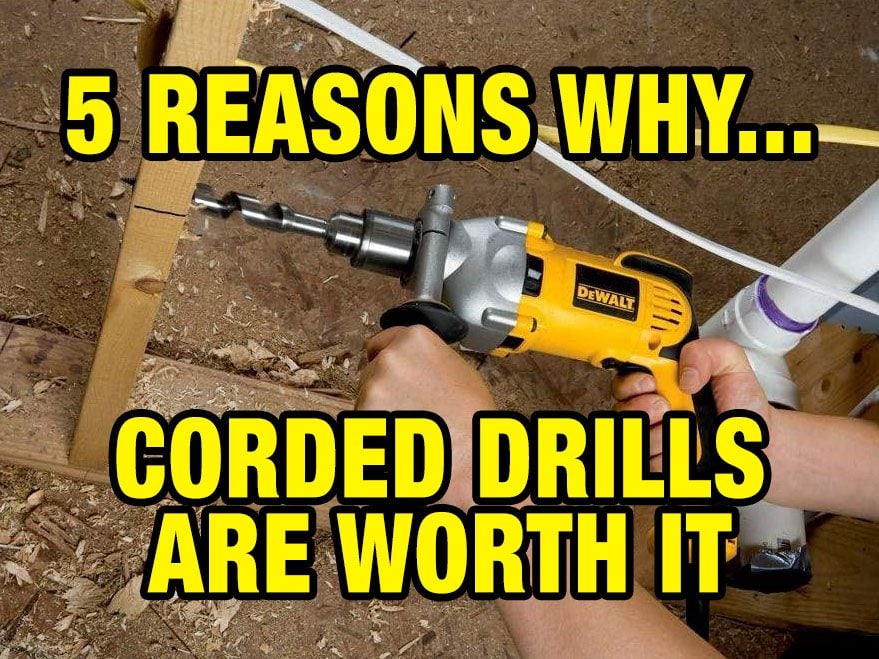I recently had installers over to screen in my back porch. Of course, they needed a hammer drill for the job. But to my surprise, they used corded ones. As I observed them, I realized that it wasn’t an obstacle, but an asset to the way they work. That got me thinking… Are corded drills still relevant?
The more I thought about it, the more I realized the answer is a resounding yes. So, here are 5 reasons why corded drills still have a place on some jobsites.
Infinite Runtime
The most obvious benefit of a corded drill vs a cordless one is infinite runtime. As long as you have access to power, you don’t have to worry about managing batteries.
You have an extension cord to drag, of course, but as long as it’s long enough to cover your work area, you still have fairly free movement.
Realistically, you’re not going to run into runtime issues with a cordless drill, especially on 1/2-day install jobs like my porch. If you’re trying to hit all your plumbing rough-in holes using a compact battery, it’s a different story. At that point, you need to ask if you’re using the right tool and battery combination, though.
Still, let’s see if we can build a strong case for the corded option.
Higher Performance
With today’s advanced batteries and brushless motors, you might be surprised to find that a corded drill often outperforms the best cordless drills.
Sounds crazy, right? But I did a little digging and found some evidence to support that claim. Here are four corded hammer drills that you can buy today:
| Corded Drills | Max RPM | Max Hammer Rate |
|---|---|---|
| Dewalt DWE5010 | 2800 RPM | 47,600 BPM |
| Makita HP1640 | 2800 RPM | 44,800 BPM |
| Ridgid R50111 | 3000 RPM | 57,000 BPM |
| Ryobi D620H | 2700 RPM | 43,000 BPM |
| Cordless Drills | Max RPM | Max Hammer Rate |
|---|---|---|
| Dewalt 20V Max XR DCD1007 | 2250 RPM | 38,250 BPM |
| Makita 40V max XGT GPH01 | 2600 RPM | 39,000 BPM |
| Milwaukee M18 Fuel 2904 | 2100 RPM | 33,000 BPM |
| Ridgid 18V Brushless R861152 | 2000 RPM | 32,000 BPM |
Corded drills typically don’t get a torque rating, so it’s difficult to compare the power side-by-side. Still, the speed and hammer rates these drills can produce are much higher than cordless models. Some cordless models are beginning to bridge the gap, but it’s still pretty wide for the most part.
High Durability
I remember having a yard sale and putting my Dad’s old drill in there. It was an old Black and Decker model that we’d had for more than 20 years, and it still worked fine. That’s the way it tends to be with corded drills—they never seem to die. You can literally throw them in the back of your truck or drop them on the ground and they just keep on keeping on.
When something finally does go wrong, the culprits tend to be the carbon brushes or a frayed cord. Carbon brushes can be replaced without too much headache. Even cords can be replaced, sometimes in the field.
Lower Cost
Corded drills are almost always less expensive than cordless models in the same entry, mid-range, and high-performance classes. Sure, you might find a deal on a cordless drill kit around the holidays that’s cheaper, but use that $50 cordless drill against a $79 corded one for anything other than light-duty work, and you’ll want the corded one.
To further make the point, here’s the same list of drills from above, along with their prices:
| Cordless Drills | Bare Tool | Kit |
|---|---|---|
| Dewalt 20V Max XR DCD1007 | $249 | $349 |
| Makita 40V max XGT GPH01 | $259 | $524 |
| Milwaukee M18 Fuel 2904 | $229 | $329 |
| Ridgid 18V Brushless R861152 | $149 | Not Available |
Notice that Ridgid’s high-performance corded drill and its best cordless model are the same price. However, the cordless model still needs a battery and charger, adding to your total cost.
Lower Theft Risk
Cordless tools are easy to walk off with, especially if they have a battery on them. Buy an entry-level charger, and it’s pretty easy to unload on an unsuspecting buyer or a shady pawn shop.
On the other hand, corded drills are a bit bulkier and there’s not as much demand for them. Along with their lower potential resale price, they’re not as attractive of a target.
Let’s give credit where it’s due, though. Smart systems like Milwaukee’s One-Key and DeWalt’s Tool Connect have tool tracking capabilities that really do aid in recovery. However, not having your tools stolen in the first place is better.
Don’t Throw Away Your Cordless Drill Yet
I’ve done my best to make the case for corded drills. That said, the vast majority of professional tradesmen and DIYers are better off with a cordless drill. Here are the main reasons why:
- Complete Movement Freedom: When your work area is broader than an extension cord covers, you’re climbing a ladder, or moving between rooms, cordless wins every time.
- Compact Size: In most cases, cordless drills have a smaller overall size than corded. Some models can also weigh less, even with a battery.
- Keyless Chuck: Most corded drills still have a manual keyed chuck, while cordless models almost never do.
- Multiple Speeds: Nearly every cordless drill has at least two speeds. Corded models can have them, but it’s a luxury upgrade.
- Clutch: Most cordless drills have a clutch to help you limit torque when you’re working with delicate material and fasteners. Most corded drills skip this feature.
- Brushless Motors: Brushless motors are common on cordless drills, improving performance, maximizing runtime, and eliminating the need to replace carbon brushes. Almost all corded drills use brushed motors.
- Advanced Features: Electronics in brushless drills open up features like smart connectivity, electronic clutches, kickback control, overload protection, and more. Corded drills don’t have them.
This isn’t an exhaustive list, and you can see that the advantages of a cordless drill eclipse corded models easily.
However, in some cases, corded drills really do make sense, especially for drilling in concrete and boring large holes in wood. The installers at my house had a limited working area and an application that benefited from higher drilling speeds. They valued the lower cost and theft potential, along with not having to manage batteries. So, for them, corded is the right call.
What about you? Are corded drills still relevant for you and your crew? Or is cordless the way to go?
Let us know in the comments below!
By the way, the company that did the work for me was True Aluminum, and they did a fantastic job. If you’re in their Central Florida service area and need screen work done, I heartily recommend them.



